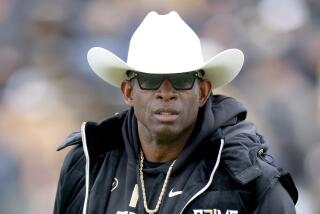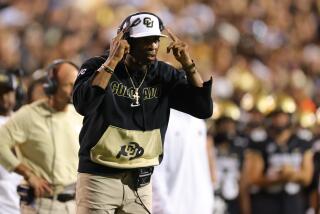Didier Plays Small Role for Redskins
- Share via
WASHINGTON — Does anyone know where Clint Didier has gone?
He’s the Washington Redskin who has caught quarterback Jay Schroeder’s longest pass, 71 yards for a touchdown against Dallas last season. He set up the winning touchdown against the Los Angeles Raiders early in 1986 with a 59-yard catch. He enabled the Redskins to go into overtime with Minnesota when he slid and caught a 44-yard pass to set up a touchdown little more than a year ago.
In 1986, Didier was spectacular. From his H-back position, he caught 34 passes for 691 yards. A 6-foot-5, 240-pound target, he stunned defenses by consistently sneaking deep to save the Redskins. On average, he gained 20.3 yards per reception.
But after missing the first two games of the season due to a pulled left hamstring and three more due to the strike, he has been used sparingly the past six games, starting just three. He has caught just seven passes for 105 yards, and five of those catches came in one game, the Redskins’ 30-26 loss to the Los Angeles Rams.
The evidence is overwhelming. Didier’s role has changed dramatically in just one season.
Coach Joe Gibbs and tight-ends coach Rennie Simmons say they still consider him a starter, but, in reality, Didier is hanging onto only one-third of the job he once held.
He must share his position with blocker extraordinaire Joe Caravello and third wide receiver Ricky Sanders--and even with co-starter Don Warren, when the Redskins bulk up with two blocking tight ends.
Didier’s importance has lessened not because of anything he has done wrong, but because other players have grown in the eyes of the coaches.
“It’s something that’s the coaches’ decision,” Didier said this week at Redskin Park. “I work here. I like to be productive. I love to make a big play, but their job is to win games and that’s what they’re trying to do. They’re trying to put a package together that’ll win games. You just hope that you’re included in them, which I have been, but to a lesser degree this year. But we’re winning games and that’s what counts.”
To ask why Didier is invisible in some games and a starter in others is to ask why running back George Rogers isn’t playing as much as he used to. The simple answer to a complex, strategic decision is this: if the Redskins need to throw the ball, they are increasingly going to rely on Sanders to play the H-back position as a third wide receiver. If they want to run, they will go with Caravello, who weighs 266 pounds, at tight end and move Warren to H-back, which is the way they started the past two games. But if there is “more of a mix,” said Simmons, they will go with Didier, who is a better receiver than Caravello or Warren and a better blocker than Sanders.
Didier is caught in the middle. The coaches apparently don’t perceive him as the blocker Caravello or Warren is, or the receiver Sanders is. “When you throw the ball, who do you want in there, Ricky Sanders or Clint Didier?” Simmons said. “Well, Ricky Sanders is a lot faster. He’s obviously faster and quicker, although Clint’s got good speed for his size.”
Said offensive assistant Dan Henning: “I don’t think Clint can win man-to-man as well as Ricky can.” Sanders, who last year was the only Redskin to have a better yards-per-catch average than Didier, has caught 21 passes this season, including the game-winner last Sunday against the New York Giants.
Ideally, if the Redskins were not falling behind in games, they would want to mix it up, run some, pass some. Simmons said Didier “absolutely” would play more in that situation. And that could happen as early as this Sunday at St. Louis, because, said Simmons, “it looks like we may have more of a balance playing those guys, although we don’t know how it will unfold.”
“Last week, he fell into the same category as George,” Henning said of Didier. “We had plans to use him more, but it got into a more wide-open strategy, and we went to Ricky. It’s like running backs. You can’t put all of them in the game at the same time.”
The sad part of all this to Didier is that he was hoping to use his 1986 season as a stepping stone to greatness in 1987. He never expected that last year would simply become a wistful memory of how good he once had it.
“I had bigger expectations,” he said. “But I guess that’s what goals are for. If at first you don’t succeed, try, try again.”
More to Read
Go beyond the scoreboard
Get the latest on L.A.'s teams in the daily Sports Report newsletter.
You may occasionally receive promotional content from the Los Angeles Times.










